Even one of the nation’s most successful TV chefs doesn’t feel safe in the woke minefield we’re now forced to navigate every day
CELIA WALDEN24 January 2022 • 7:00pm

Jamie Oliver doesn’t just have the one ‘offence adviser’ but ‘teams of cultural appropriation specialists’ who go through his recipes with a fine tooth comb CREDIT: Jamie Oliver Enterprises Ltd, photographer Steve RyanHave you got yourself an “offence adviser” yet? This new breed of professionals are trained like sniffer dogs to detect even the faintest whiff of explosively un-woke material in anything that might be publicly shared, from company reports and social media posts to university lectures, early drafts of books, songs, screenplays and art works.Not that offence advisers should be limited to the professional domain – their expertise doesn’t stop there. No, like bomb disposal experts, these guys (and gals, and agender, bigender and cisgender identifiers, I’ve been advised to add) will zoom in and short-circuit any “problematic material” before it detonates. So those with Generation-Z age kids (born between 1997 and 2012) would do well to have their own personal OEs perched upon their shoulders at family get-togethers, there to step in with the red wire snippers before any casual “denial of lived experience”, “misgendering” or airing of a Churchill quote (racist, imperialist brute that he is) sparks a domestic blast.Jamie Oliver doesn’t just have the one “offence adviser”, he revealed on Sunday, but “teams of cultural appropriation specialists” who go through his recipes with a fine tooth comb. The 46-year-old TV chef is all too aware of the woke minefield we’re now forced to navigate daily, after having stepped on one back in 2018 when he started peddling Punchy Jerk Rice in supermarkets. This prompted Labour MP Dawn Butler – the daughter of Jamaican immigrants – to tweet: “I’m just wondering do you know what #Jamaican #jerk actually is? It’s not just a word you put before stuff to sell products. Your jerk rice is not ok.”
Jamie Oliver accused of cultural ‘appropriation’ by minister after he la…When Jamie Oliver launched his new “punchy” jerk rice in supermarkets, he hoped consumers would fall head over h…
And although both Oliver and his £2.30 microwavable rice survived the ensuing furore – one that largely confined itself to the digital universe specialising in “fauxffence” – the country’s best-selling non-fiction writer is no longer taking any chances. Especially not with his new Channel 4 series, The Great Cookbook Challenge, starting in less than a week’s time.Oliver has learnt a lot about inanimate foodstuffs’ powers of offence over the past four years. He knows, for example, that his 2012 “empire roast chicken” – seasoned with turmeric, cumin, coriander and garam masala – would be unacceptable, if not career-ending today. And as for cultural appropriation, he says in an interview at the weekend: “Your immediate reaction is to be defensive and say, ‘For the love of God, really?’ Then you go: ‘Well, we don’t want to offend anyone…’”Oliver is not the only food writer to launch an anti-offence offensive. Nigella Lawson has been on her best behaviour ever since she upset Italians in 2017 by suggesting that cream be added to carbonara instead of the traditional raw eggs, and two of the world’s leading food publications – the BBC Good Food magazine and Bon Appétit in the US – were forced to make “linguistic changes” to some of the tens of thousands of recipes in their archive, after accusations of “stealing” dishes from ethnic minorities.“No one is suggesting that it is wrong to cook food from another culture,” one newspaper recently pointed out. Yet isn’t that the loud and clear message? Indeed, crediting those other cultures only seems to make matters worse. Had Oliver named his punchy rice “Jamaican Jerk”, his jovial little head would have been served up on a platter (using only traditional British seasonings).As it was, his defence only inflamed things further. “I’ve worked with flavours and spices from all over the world my whole career,” he protested at the time, “learning and drawing inspiration from different countries and cultures to give a fresh twist to the food we eat every day.” Just as Gordon Ramsay’s defence of his Lucky Cat restaurant did back in 2019, after the central London “Asian eating house” opened to a slew of derogatory comments on social media.Ramsay’s crime was to call Lucky Cat’s cuisine “authentic” – which was, granted, inadvisable, in a pedantic and pedestrian climate where authenticity could only be guaranteed by an 100 per cent Asian-staffed kitchen. Certainly, the word would now have any “offence adviser” whipping out his snippers.But if “inspiration” had been a problematic concept throughout history, then the OEs would have shut down Thomas Gainsborough (for being inspired by Rubens), and Rubens (for being inspired by Caravaggio), along with Charles Dickens (for being inspired by Victor Hugo). Most importantly, chicken tikka masala would not exist. Because, according to many culinary sources, the nation’s favourite dish only became what it is now after migrant Bangladeshi chefs here played around with their traditional “butter chicken” recipe. And in an ironic inversion of history, British companies now export that dish to Pakistan, India, and Bangladesh.Does this mean everyone should be offended – or no one? I’m losing track. But one thing I am sure of: whatever the origins, whatever the recipe, there is no greater insult to any chef than calling a dish “inoffensive”.
https://www.telegraph.co.uk/news/2022/01/22/acas-acting-like-east-germany-says-employee-accused-racism-sharing/
Acas acting like East Germany, says employee accused of racism for sharing equality posts
Sean Corby is currently being investigated by his bosses after staff complained over critiques of woke culture that he posted on a forumByEwan Somerville22 January 2022 • 8:30pm
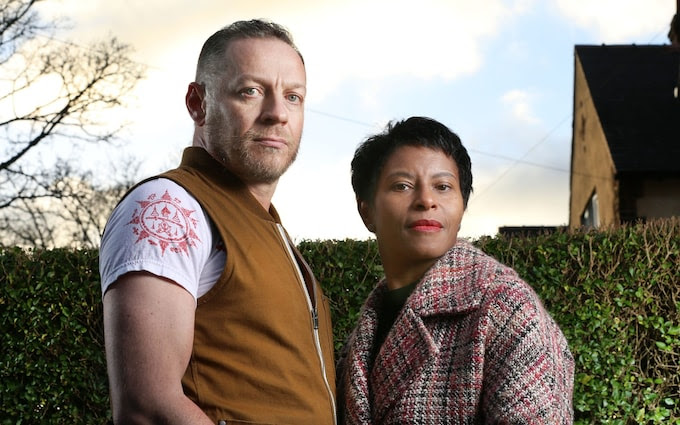
Sean Corby with Tracy, his wife. One of the posts he shared explored the impact of anti-racist activism on interracial couples CREDIT: Lorne Campbell/Guzelian for The TelegraphA mediator at the official body for workplace conduct has accused his employer of acting “like East Germany” after he was put under investigation for racism for sharing articles about equality.Sean Corby, a senior conciliator at Acas, has been under investigation since last August after colleagues complained that messages he posted on an equality and diversity forum with more than 100 members were “discriminatory” and “racist”.One post quoted writer Ayishat Akanbi’s video The Problem with Wokeness, while in another Mr Corby shared an article on the impact of anti-racist activism on interracial couples, of which he and his wife, Tracy Corby, are one. He wrote that he had “experienced abuse and bigotry from both ‘sides’” but that “worryingly divisive” current ideologies ignore this.Another post quoted defences of free speech from figures including Howard Thurman, the civil rights leader who influenced Martin Luther King. One described how Thurman had “railed against separatism and segregation” in his social justice activism. Another quoted the Nigerian writer Chimamanda Ngozi Adichie’s critique of cancel culture, with “young people terrified to tweet anything” and emotive language used “like tarnished pitchforks”.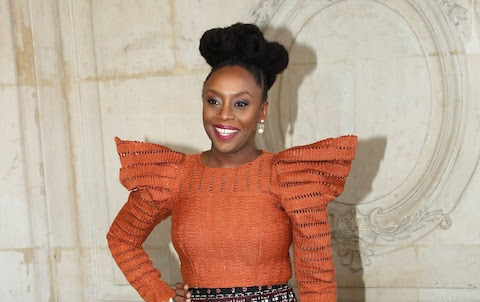
Sean Corby shared, among other things, Chimamanda Ngozi Adichie’s critique of cancel culture CREDIT: Bertrand Rindoff Petroff/Getty ImagesAnother linked to an article by Inaya Folarin Iman, a free speech campaigner and GB News host, which argued that “currently fashionable conceptions of marginalised identities” are incompatible with “the fearless exchange of ideas”.The complaint, from four colleagues unknown to Mr Corby, alleged that he “demonstrates a deep-rooted hatred towards black and minority ethnic people who challenge racism, organise in black structures and safe spaces and mobilise against racism”.They accused him of “trying to force his view on us” and went on: “Having read all Sean’s posts, I would not feel safe to be in contact with him in person… I don’t know where Sean works, in terms of office, but I fear for any black and minority ethnic people working there if there are any.”Mr Corby said there was “nothing that anybody could remotely construe as being racist” in his posts, drawn from his experience living in an interracial family with his wife and socialising in black communities. “A cabal of extremists are either influencing Acas leadership, or they are themselves going along with this ideology. It is bullying and harassment based on me sharing absolutely valid opinions in an appropriate way,” he told The Telegraph.He claimed that staff are “bombarded with ideological initiatives” and criticised “snake oil” unconscious bias training that Acas runs for workplaces, despite the Government’s Race Commission and Liz Truss, the Foreign Secretary who is also the Equalities Minister, saying it is ineffective and must end.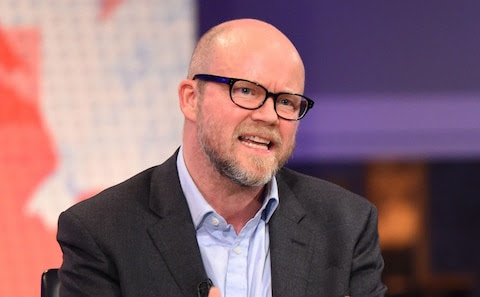
Toby Young said that the case was ‘shocking’ CREDIT: Dominic Lipinski/PA WireFollowing an investigation, the complaint was not upheld in late October after Acas ruled there was “no substantial evidence” that Mr Corby posed a risk to ethnic minority staff. But last week, he was informed that an appeal had been lodged, further prolonging the process.Mr Corby, who helps to resolve pay disputes, claims he has been “left in limbo” for six months in a workplace culture “like east Germany if you don’t toe the line”.He is now formally complaining to Acas, which received almost £57 million in taxpayer funds last year, over how it has conducted the racism probe, claiming it goes against “everything they charge employers to be trained on”.Toby Young, the general secretary of the Free Speech Union, said that the case was “shocking”.“Across the civil service, no one is allowed to dissent from the dogma of equity, diversity and inclusion, including people of colour,” he said. “Indeed, woke activists treat black intellectuals who challenge this orthodoxy with particular contempt because they regard them as race traitors.”An Acas spokesman said: “Creating fair and inclusive workplaces is at the heart of everything we do and we do not recognise the picture presented by Mr Corby. Our regular staff surveys continue to show that Acas is an inclusive place to work and our training services receive positive feedback from our customers.“We cannot give a running commentary on individual disciplinary and grievance cases that we deal with as we have to respect the confidentiality of all the staff members involved.” https://www.telegraph.co.uk/news/2022/01/23/cambridge-college-alumni-take-row-slavery-linked-donor-court/?li_source=LI&li_medium=liftigniter-rhrCambridge college alumni take row over slavery-linked donor to court, in UK firstJesus College faces a revolt over plan to strip memorial of Tobias Rustat, a courtier to Charles II, from chapelByCamilla Turner, EDUCATION EDITOR23 January 2022 • 9:00pm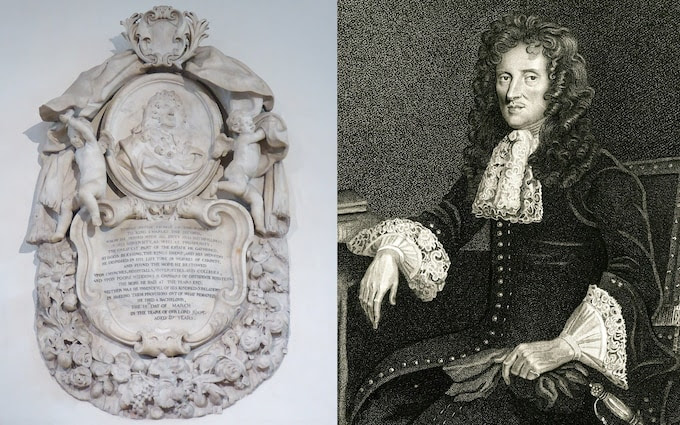
The Rustat memorial (L) of Tobias Rustat (R)A university cancel culture row is to be heard in court for the first time, as a Cambridge college attempts to remove a memorial to a benefactor linked to slavery. Jesus College, Cambridge wrote to the Church of England to propose that the memorial of Tobias Rustat should be stripped out of its chapel following research which revealed he was a “major investor” in a seventeenth century slave trading company.When the college submitted its petition to the Diocese of Ely it may have been waved through – were it not for the staunch and organised opposition it faced from its own alumni.
Historians will look back on ‘significant’ moment
Now the question of whether the Rustat memorial can stay or go will be subject to a full consistory court hearing, which will take place next month.“Hitherto colleges have decided themselves about this sort of thing, but here you actually have a judicial proceeding,” a source familiar with the process said.“Historians in the future will probably look back on this moment and say ‘ah, this is significant’ – there will be court papers, a judgement and official records.”Rustat donated £2,000 to Jesus College – his father’s alma mater – in 1671 for scholarships for orphan sons of Anglican clergymen.
Jesus College Chapel and Cloister, University of Cambridge CREDIT: Neil Grant / Alamy Stock PhotoWhile much of his wealth was derived from his career as a courtier to King Charles II, he was also an investor in The Royal African Company and also took a role in running the organisation.The historian William Pettigrew said that the Royal African Company “shipped more enslaved African women, men and children to the Americas than any other single institution during the entire period of the transatlantic slave trade.”Jesus College said that investors were “fully aware of the Company’s activities and intended to profit from this exploitation”.Some 65 alumni lodge formal objection When the college’s alumni first heard about the desire to remove Rustat’s memorial from the chapel, and install it in a permanent exhibition space elsewhere in the College, some of them started writing to the Master to raise their concerns.However, when the College served notice of their petition to the Diocese of Ely in December 2020, they realised they had to move more quickly.“The registry of the court said we had to reply to this within three weeks,” one of the group’s members explained. “We suddenly realised we had to do something rather more formal than just write letters.”Some 65 alumni – who call themselves the Rustat Memorial Group – lodged a formal objection to the petition, and then raised funds to instruct an ecclesiastical barrister to represent them at the hearing.“We felt that it was going slightly under the radar, the college didn’t expect any resistance,” a spokesman for the group said.“We are beating the drum making sure Rustat gets a fair hearing. We feel this is over the top. “He gave away £10,000 during his lifetime which is worth millions now. He did all this good stuff – and yet he is being pulled apart for something that wasn’t illegal or even disapproved of at the time .“Obviously slavery is abhorrent, no one diasagrees with that now. He wasn’t running a slave company, he was a courtier to Charles II sitting in London. Do we really drag him through the mire for this?”The alumni group – who are listed by the court as a “party opponent” to Jesus College – will call on a number of expert witnesses including Oxford University’s Prof Nigel Biggar, an expert in moral and pastoral theology and Dr Roger Bowdler, who specialises in architectural history.Meanwhile the College will call on the Bishop of Ely, the dean of the chapel and the Master of Jesus to give evidence in support of their petition.’Stripping away at the history’ of church buildings is a ‘risky business’ Prof David Abulafia, an emeritus professor of history at Cambridge, said there is a “virtue signalling side to all this”. He added that removing memorials and “stripping away at the history” or church buildings is a “risky business”.“This is a potentially very rich source of material for those who want to demolish monuments,” he said.“There is no end to it. It takes us back to the sixteenth and seventeenth century puritan demolition of church buildings.”The hearing will take place in Jesus Chapel itself, and will be heard before His Honour Judge David Hodge QC.In addition to his donations to Jesus College, Rustat also donated to Cambridge University’s library its first endowment of £1,000 to spend on books.The university has made “preliminary enquiries” about whether Rustat’s statue, which is erected at the library’s original site, can be removed.Referring to the Rustat memorial, a Jesus College spokesman said: “It comes down to whether it’s in the best interests of our current and future students and fellows for this celebratory memorial to be in our Chapel, a place of worship at the heart of our diverse community.”Latest in a string of institutions embroiled in culture rows Jesus College is the latest institution to become embroiled in a row over an early benefactor and their links to the slave trade.At Oxford, students have been campaigning for the removal of Cecil Rhodes’ statue from Oriel College’s main facade since 2015.
Rhodes, a British imperialist who founded Rhodesia and served as prime minister of the Cape Colony in the 1890s, donated a huge sum to Oriel in his will. He was not a slave trader but supported apartheid-style measures in southern Africa.
In summer 2020, when protests were reignited in the wake of the Black Lives Matter movement, Oriel’s governing body said it was their “wish” to remove the statue. But they decided last year that it should stay for the time being on the basis that it would take too long and cost too much to remove it.Meanwhile Bristol University has been under pressure from students over its links to Edward Colston, a 17th-century slave merchant and philanthropist.The university has already removed his name from one of its accommodation blocks, changing it from “Colston Street” to “Accommodation at Thirty-Three” and it has launched a review of its logo which features his crest.University College London has “denamed” buildings which honour eugenicists after coming under criticism for its historic links with the movement.Lecture theatres and a building named after prominent eugenicists Francis Galton and Karl Pearson were renamed in June 2020.Imperial College London is considering whether to rename a building and remove a bust of slavery abolitionist Thomas Henry Huxley after a review it commissioned concluded that he “might now be called racist” owing to his views on a hierarchy of racial intelligence.
Imperial College told to remove bust of slavery abolitionist because he …University could also rename buildings as it seeks to ‘confront, not cover up, uncomfortable or awkward aspects …
Finally, feminists are asking: what do men want? Finally, feminists are asking: what do men want?
Finally, feminists are asking: what do men want?Two new books wrestling with the masculinity crisis – one by a woman, one by a man – are put to the test. The re…
Two new books wrestling with the masculinity crisis – one by a woman, one by a man – are put to the test. The result is surprisingTIM STANLEY
22 January 2022 • 12:00pm

Thoroughly modern man: singer Harry Styles at the Grammys in March 2021 CREDIT: Anthony Pham
In front of me are two books about men, and, curiously, it’s the one by a woman that is sympathetic and the one by a man that would consign my sex to the dustbin of history. It borders on a hate crime.
Patriarchy, according to Ivan Jablonka, a French historian, is immoral and artificial – something we’ve invented over the centuries to keep men on top. The problem with that thesis, he acknowledges, is that in primitive societies, too, male dominated female. To explain why something invented is perennial and universal, Jablonka tries to distinguish between biological sex (i.e. cavemen were more “robust” than women, so they took the lead in hunting) versus the cultural norms of gender, which he sees as an evolved effort to institutionalise the differences between men and women.
“Patriarchy proceeds from an interpretation of bodies: it transforms female biology into destiny, subjecting women to one function”, namely reproduction, and while women are expected to pop out babies or care for them, “men are at leisure to take over other spheres: the economy, war, power, and so on”. This order was threatened by the French Revolution, which by opening the door to universal rights allowed female equality to follow behind.Advertisement : 15 sec
Jablonka is obsessed with patriarchy the way others are with critical race theory or ancient UFOs – it explains almost everything – and in his reduction of all human experience to the battle between the sexes, the individual becomes depressingly powerless. Jane Austen’s clever female characters might know what they want, but they still want a man – “struggling within stifling gender norms” – and women who claw their way up the corporate ladder in the 21st century, by exhibiting “masculine norms” such as “leadership, competition, toughness”, become “accomplices of the patriarchy that reserves a place for them”. Women might think they’re winning, but they’re not.
And when men think they’re being moral, they’re actually doubling down on the system. Jablonka divides up male strategies for dominance into four categories: we lead by “ostentation”, a display of virility; by “control” or self-denial; by “sacrifice”, offering one’s life for a higher cause; and through the game of “ambiguity”, by integrating the feminine.

A drawing of early men learning to create fire CREDIT: Alamy
Sacrifice is “horrifying”, argues Jablonka, because it validates war and suicide. Yet critics will counter that it also encourages charity, modesty and martyrdom – just as virility can sometimes protect the weak. Indeed, if our natural state really is men clubbing each other over the head, perhaps patriarchal civilisation is a step up.
It also contains a space for joyous gender-bending (trans, drag, queer, etc.), though Jablonka believes men who soften their masculinity with eyeliner are often reasserting that while women are “tied to their sex”, men are free to be “armed or bejewelled, tearful or insensitive”. Again, it’s impossible to win. Even Harry Styles is a tool of the system. This book is so pessimistic that it’s hard to see on what basis men and women can ever progress peacefully; for one to advance, the other must retreat.
Far more hopeful, and better written, is philosopher Nina Power’s What Do Men Want? If you proceed on the assumption that masculinity is inherently toxic, she argues, you risk implying that most men are bad – and they’re not. “Far from possessing great power, men are frequently trapped in systems of other men’s making.” To be a man nowadays is “in great part, and at the risk of sounding dramatic, to suffer” – from comparatively high rates of suicide, homelessness and murder, and stereotyping.
Patriarchy might be part of the problem, as Jablonka also argues, by compelling men to live according to masculine codes that are as repressive to them as they are unfair to women, but declaring war on masculinity will only add to men’s sense of alienation, at a moment when aspects of culture and economics have moved in women’s favour. The new economy rewards brain; brawn is out of style. “It’s more fashionable to be a woman,” Fay Weldon is quoted as saying. “Women appear to be more powerful, at least among young men.”
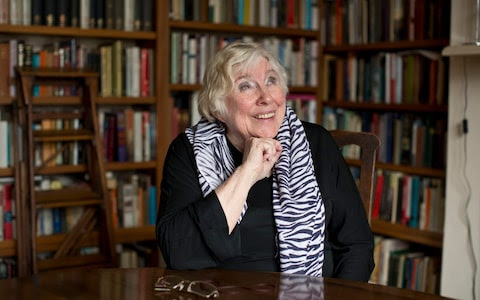
Author, essayist and playwright Fay Weldon CREDIT: Heathcliff O’Malley
Nina Power suggests that, rather than dismissing the whole notion of masculinity, it might be better to recognise the reality of sex differences rooted in nature; encourage men to identify as part of a class, one that has severe problems and could do with more solidarity; and investigate those aspects of masculinity that are useful to us all, “to revisit old values and virtues” such as “honour, loyalty and courage… in the name of reconciliation”.
If Jablonka favours a Year Zero approach, Power is almost conservative, building a future upon the best of the past. The family “came to be seen by those on the left as traditional or oppressive. [But] the family can also be understood as a bastion of resistance against the outside world.” When life goes mad, mum and dad “bring you back down to earth with love and understanding”. Power deserves credit for trying to get into the heads of the men she quotes, even if boorish or chauvinist. She displays female empathy. Jablonka, more of a man than he might admit, does not.
An alternative view, alien to both writers yet held deeply by billions across the planet, is that sex is not an evolutionary accident, but designed for a purpose, and that our characteristics flow from a divine order. Male and female, according to the Bible, were meant for each other. Adam was incomplete, so God created Eve. And, yes, Eve then tempted man to eat the forbidden fruit, destroying our collective innocence, but, as the 18th-century monk Benito Feijóo argued, the fact that Adam fell for this scam only confirms man’s intellectual and moral weaknesses. I’d wager more men have enthusiastically replied to emails from Nigerian princes than women have.
Men are flawed, often in a very funny way. By peppering her book with humour, Power rehumanises the gender debate. Jablonka, deadly serious in his academic gobbledygook, descends into a woke self-parody that sounds suspiciously like mansplaining. At the end, he writes: “While I am a man in my body, heterosexual in my choices, a professor in my career, I feel uncomfortable in the masculine. I am not inclined to become a woman, but I gladly switch genders.” This is the kind of nonsense a man typically spouts in a misguided attempt to talk a feminist into bed.
A history of masculinity by Ivan Jablonka, tr Nathan Bracher (★ ) and What do men want? by Nina Power (★ ★ ★ ★ ) are published by Allen Lane at £25 and £18.99 respectively. To order these books from the Telegraph for £19.99 and £16.99, visit books.telegraph.co.uk or call 0844 871 1514
BBC makes ‘woke cuts’ to archives, including Dad’s Army
BBC makes ‘woke cuts’ to archives, including Dad’s Army
The broadcaster has purged a number of racist and misogynistic jokes as well as mentions of disgraced stars Jimmy Savile and Rolf HarrisByMax Stephens22 January 2022 • 1:32pm

Television Dad’s Army
The BBC has purged mentions of disgraced stars Jimmy Savile and Rolf Harris along with a number of racist and misogynistic jokes used in several of its classic radio comedies.
An anonymous Radio 4 Extra listener discovered the BBC had been quietly editing repeats of shows over the past few years to be more in keeping with social mores, the Times reported.
Labelling them as “woke cuts,” the listener found edits had been made to old episodes of Dad’s Army, Steptoe and Son and I’m Sorry, I’ll Read That Again.
In some cases entire sketches had been removed.
For example, a repeat of a 1970 episode of I’m Sorry, I’ll Read That Again, starring John Cleese and Bill Oddie, had a joke about a scantily clad woman removed.
In the original broadcast, Cleese, impersonating a BBC spokesman, said: “We have noticed that it is possible to see right up to the girls’ knickers, owing to the shortness of their miniskirts, so we’ve asked the girls to drop them.”
The BBC also stripped a mention of the n-word from a 1972 episode of the Ronnie Barker sketch show Lines From My Grandfather’s Forehead.
A reference to African people being “cannibals” was also removed from a 1950 episode of Much Binding in the Marsh, a comedy set in a RAF station.
In a sketch from 1970, David Hatch adopted an Indian accent and was described as being “browned off”. The skit was removed.
Other deleted sketches included a spoof of Harris’s songs, titled Rolf Harris’s Dirty Songbook.
A spokesman for the BBC said: “Listeners enjoy a huge number of old comedies from the archives on 4 Extra and on occasion we edit some episodes so they’re suitable for broadcast today, including removing racially offensive language and stereotypes from decades ago, as the vast majority of our audience would expect.”
As with Jussie Smollett, the most powerful hoaxes are those we want to believe
It is no surprise that American politicians and celebrities were taken in by a fake ‘racist and homo-phobic’ attackBORIS STARLING11 December 2021 • 10:00am
It was the perfect story for these atomised and fractious times. The victim was a gay black actor on a successful television show: his attackers were two white men who shouted racist and homophobic abuse referencing Donald Trump slogans, poured bleach on him and tied a noose around his neck. If ever you wanted an example of America’s ugly side, one both legitimised and enabled by Trump’s presidency, this was too good to be true.
Which, of course, is just what it turned out to be. That actor, Empire’s Jussie Smollett, was
